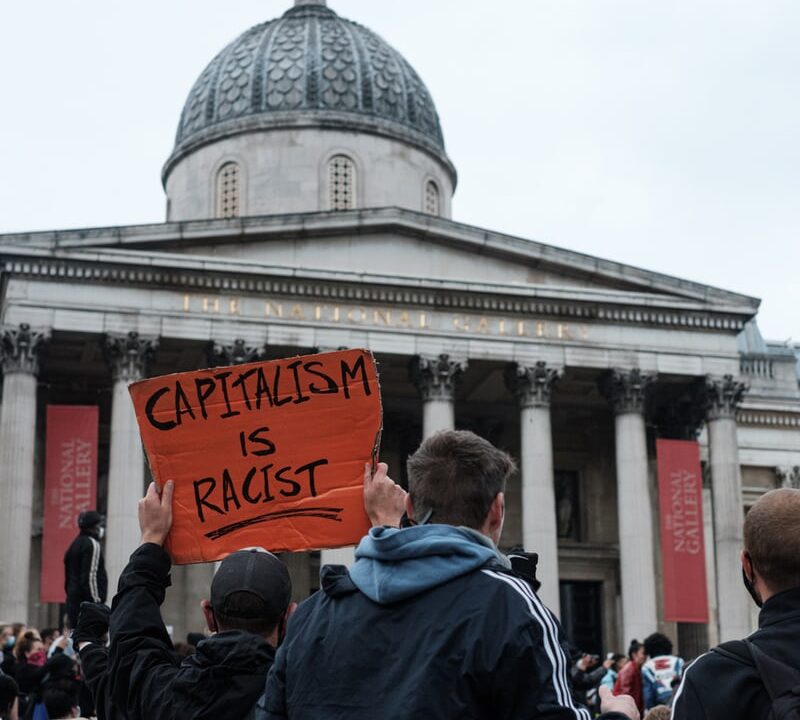Over the past year, funders of social justice organizations have been building their understanding of Dr. Cedric Robinson’s concept of racial capitalism as the root cause of the problems and conditions that movements and funders aim to solve. Networks of funders, like philanthropic affinity groups, are creating educational spaces to understand racial capitalism and the history of racialization and white supremacy, forced labor, settler colonialism, genocide, and resource extraction for individual gain. But funders can do more than simply educate themselves on racial capitalism. Grantmakers must show up differently for frontline communities that are rising up against gender-based and state violence, continuing to grapple with the COVID-19 public health and economic crisis, and working to dismantle systems of oppression for Black, Indigenous, and people of color (BIPOC) communities. Philanthropic institutions can and must play a role in dismantling racial capitalism.
There are many limitations in philanthropy’s ability to dismantle racial capitalism. Dr. Ruth Wilson Gilmore describes philanthropy as twice-stolen wealth. The rich accumulate their wealth through forced extraction of the labor, land, and culture of Black, Indigenous, and people of color communities and then shelter their profits from taxation through philanthropic institutions, which generally make charitable investments into institutions that are built to serve them. Philanthropic institutions have long been used to promote settler colonialism, white cultural norms, and white supremacist, hetero-patriarchal, and Christian ideology. They create a false sense of scarcity and an overreliance on their donations, and, through their decisions about whom to fund, develop narratives about who belongs and deserves care. Meanwhile, the corporations whose profits undergird philanthropic institutions shirk responsibility for the welfare of their employees in low-wage industries, cheat our tax system, hamstring the government’s ability to regulate them, and barely contribute to local public budgets.
Most foundation boards are represented by wealthy people who have a vested interest in maintaining the status quo. Boards are tasked with making investment decisions without an understanding of community needs or any community input. Because most nonprofits rely on foundation dollars to carry out their work, the wealthy are also able to use their philanthropic endeavors to silence and squash radical resistance efforts, movements, and grassroots power. During the campaign for California’s Proposition 22 — which classified drivers for app-based transportation companies as “independent contractors,” not employees — Uber and Lyft bought the support of prominent community organizations through significant donations.
But some foundations are taking critical steps to transform their institutions. At Neighborhood Funders Group (NFG), we partner with impacted communities to organize philanthropy in dismantling the structural conditions that racial capitalism perpetuates. We do this through political education, leadership development, and programming that supports foundations to move money for racial, gender, economic, and climate justice. Our analysis is that the philanthropic sector is not currently set up to shift power and resources to the BIPOC-led organizations working towards racial, gender, economic, and climate justice. Recognizing that philanthropy is not organized or accountable to BIPOC and low-income communities has offered us an opportunity to explore how philanthropy can shift its practices and grantmaking in order to resource those most impacted in building a multi-racial, multi-gender, multi-generational, feminist, and regenerative movement for justice.
Here are five ways philanthropy can begin to dismantle racial capitalism and shift its practices toward realizing the vision of movement organizations.
Learn Towards Action
Political education is critical for funders to truly partner with social movements, align strategy, and take action. As a starting place, NFG developed tools and resources to move from political education to action through its Project Phoenix program, Philanthropy Forward program, and Amplify Fund. Additionally, we’ve produced reports, such as Journey Towards Intersectional Grantmaking, which offer funders action steps that our members recommend.
Funders for Justice developed the Divest/Invest toolkit to support grantmakers in confronting and divesting from criminalization. Justice Funders created Resonance: A Framework for Philanthropic Transformation, which presents a detailed summary of the history of philanthropy, a vision for the sector, and a framework and guide to help foundations along their own journey. Solidaire Network created a racial capitalism study group with its membership to move individual donors and funders toward political education and action.
Use a Liberatory Approach to the Wealth
Philanthropists must learn how their foundations’ wealth was accumulated. Doing so opens up the opportunity to liberate that wealth by returning it to the communities from which it was extracted. Center for Economic Democracy’s learning community for funders and investors — called Movement Portfolio Theory — is an investment framework that aims to democratize wealth and ensure that those most impacted are making decisions about how investments are made. The Nathan Cummings Foundation (NCF) produced a toolkit for mission-aligned investing that outlines how NCF is moving to deploy one hundred percent of its assets in service of its mission and values, and how other funders can follow suit. And last year, Dimple Abichandani of General Service Foundation outlined their journey to shift their spending policies to align with their values.
Another way to adopt a liberatory approach to wealth is by organizing within your own institution and among other funders and donors to shift their grantmaking practices. We can’t rely on social justice movements to build and win campaigns that increase community power and constantly organize funders to move more resources to their work. Funders must take initiative to shift the priorities of foundations and boards to move more money to movement groups. One place to start is to join groups of co-conspirators through spaces like Neighborhood Funders Group, Funders for Justice, Grantmakers for Southern Progress, CHANGE Philanthropy and its coalition of partners, and Justice Funders to get peer support, engage in political education, and learn about ways to move money differently.
Funders can also start by reviewing foundation grant portfolios. Isabel Sousa-Rodriguez of the Edward W. Hazen Foundation shared recommendations about how to review grants. Adding to her tips: Are grants funding movements and organizations led by and impacting BIPOC communities? Are grantmaking decisions determined by the foundation’s own ideas about which campaigns are winnable or successful, or are these determinations based on deep partnerships with movement leaders? Are funds directed toward worker and housing cooperatives, a solidarity economy, or alternative wealth building models? Who makes grant decisions at the foundation?
Trust Movement Partners and Align with their Vision and Strategy
One of NFG’s biggest takeaways from 2020 was that when philanthropy is forced to move resources quickly toward social movements, it can. At the onset of the COVID-19 crisis, funders moved resources to health care; to hard-hit industries, like hospitality and tourism; and to vulnerable communities, like non-citizens and unhoused communities. Following the murder of George Floyd, funders also moved money toward racial justice. Many were able to move these funds quickly because they had relationships with movement partners. Significantly, however, in cases where funders didn’t have relationships, they moved the money anyway — and were forced to trust movement groups to know the problems and solutions. Now that we know it’s possible to move money that way, let’s do more of it and ensure that we create sustainable, longer-term funding for racial justice organizations without the unnecessary and drawn out proposal process.
There are incredible groups that are building bolder, multi-issue agendas by connecting local organizing to mass coalitions of community groups and worker-led organizations, including the Movement for Black Lives, The Frontline, Grassroots Global Justice Alliance, Athena, Right to the City, NDN Collective, Climate Justice Alliance, and It Takes Roots. These coalitions are working together to build toward strategic wins while also organizing their communities locally for longer-term power shifts. Philanthropy must learn from their strategies, base its grantmaking decisions on the work and vision that these movements are calling for, support coalitional efforts, and fund the smaller grassroots groups that make up these powerful coalitions.
Mobilize Resources for Global Solidarity
We face global challenges, from COVID-19, the climate crisis, and corporate power to rising facism and global disinformation campaigns. The world is evolving, and so are our movements, which are increasingly engaging in global solidarity actions.
In order to support this global effort, foundations must resource groups to convene and meet with communities around the world. Providing funding for groups to travel (once it is safe to do so) and meet virtually (with adequate resources for interpretation and translation of materials) will be key to meeting these challenges. In the worker justice space, rideshare drivers, warehouse workers, garment workers, and agricultural workers are connecting with their industry counterparts across the globe to raise standards, improve job quality, share technical expertise and strategies, and hold corporations accountable. Supporting these movement partners to continue to build their global strategies and reach is essential.
Digital organizing has been a critical strategy during the pandemic and will continue to play an important role in connecting movements globally. But these technologies, built by massive global corporations, are not secure and have also been used to suppress activism and social movements. Philanthropy must invest in movement-led and built grassroots technology that doesn’t rely on major corporations, which sell data and information and which are complicit in state suppression efforts.
Shift Philanthropic Culture and Practice
The most important way philanthropy can dismantle racial capitalism is to shift philanthropic culture, which is rooted in white supremacy and capitalism. To dismantle racial capitalism, funders must recognize and interrupt how the philanthropic sector’s culture — including a constant evaluation of risk and an ungrounded idea of success — upholds racial capitalism.
Philanthropy must resource movement partners abundantly for the long-term sustainability of the movement through general operating support, multi-year grants, and simplified proposals and grant reports. Philanthropic institutions must champion their grantees by uplifting their work, sharing their leadership and expertise with other funders, and introducing them to potential new funders. NFG’s recent Building Power in Place report about Nashville, Tennessee, suggests supporting local and regional organizing infrastructure and partnering with local funders as a way to deepen investments and increase the opportunity for transformational shifts in wealth and power.
Organizers are skilled strategists who see the value of experimentation, constant evaluation, and iteration. They also know that the cards are stacked against them, so they have a healthy view of what is possible in the short, medium, and longer term. Philanthropy must shift to align funding with the movement’s longer-term path to power.
Funding to compensate organizers and staff well is also critical to the longer-term sustainability of the movement. Many organizations cannot offer salaries that align with the cost of living in their communities or provide benefits, such as professional development opportunities and retirement fund contributions. Funders must shift their grantmaking so that it prioritizes general support funds instead of project-specific funding to ensure the long-term sustainability of organizations. Building a Just Culture and Staffing the Mission Project are important resources for funders who are interested in supporting non-profit staff.
***
Implementing these five recommendations depends on all of us in the philanthropic sector. If philanthropy does not take action to dismantle racial capitalism, it will remain complicit in maintaining the status quo and be unable to meet the growing needs of the most impacted communities. NFG is committed to the journey of organizing philanthropy, and we believe in the iterative process of experimentation, evaluation, and integration to do so. As part of your journey, we invite you to organize with us and take action.


